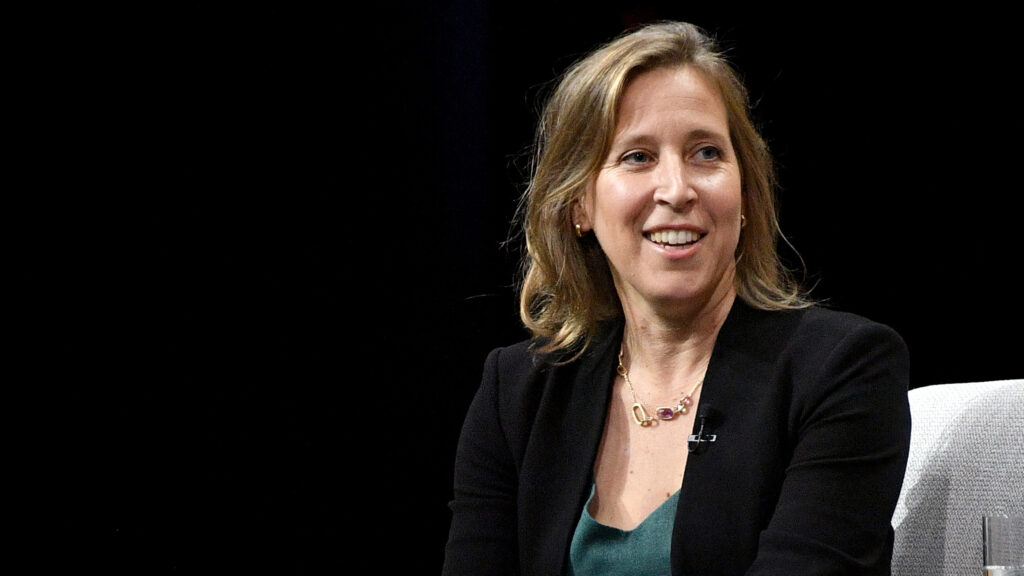
Susan Wojcicki is a Polish-American technology executive who is the CEO of YouTube since 2014 and was also involved in the founding of Google, and became its first marketing manager in 1999.
Early life and education
Susan Diane Wojcicki is a Polish-American, who was born on July 5, 1968, in Santa Clara, California. Wojcicki is the daughter of Stanley Wojcicki, a Polish-American physics professor at Stanford University, and Esther Wojcicki, an educator of Russian-Jewish descent. Wojcicki grew up on Stanford campus with George Dantzig as a neighbor. Wojcicki has two sisters: Janet Wojcicki, a Ph.D., epidemiologist, and an anthropologist, and Anne Wojcicki, a founder of 23andMe.
Wojcicki attended Gunn High School in Palo Alto, California and wrote for the school newspapers. In 1990, Wojcicki studied history and literature at Harvard University and finished with honors. Wojcicki first thought on getting a Ph.D. in economics and preceding a career in academia but when she discovered an interest in technology her plans suddenly changed. In 1993, Wojcicki attended University of California, Santa Cruz and earned an M.S. in economics. In 1998, Wojcicki earned an M.B.A. from the University of California, Los Angeles.
Career
In 1998 of September, founders Sergey Brin and Larry Page set up a workplace in Wojcicki’s garage in Menlo Park to the newly incorporated Google Inc. In 1999, Wojcicki became the first marketing manager in Google, worked in marketing at Intel Corporation in Santa Clara, California, and was a management consultant at Bain & Company and R.B. Webber & Company. Wojcicki worked on the initial viral marketing programs at Google, as well as the first Google Doodles. Wojcicki also took part in the expansion of triumphant contributions to Google such as Google Books and Google Images. Wojcicki grew within the company and became the senior VP of Advertising & Commerce, and direct the advertising and analytic products, including AdSense, AdWords, DoubleClick, and Google Analytics.
YouTube, a small start-up then, was successfully competing with Google Video service, managed by Wojcicki. Wojcicki’s response was to recommend the purchase of YouTube. Wojcicki also ran two of Google’s largest acquisitions – the 2006’s $1.65 billion purchase of YouTube, and in 2007, the $3.1 billion purchase of DoubleClick.
Youtube
Wojcicki became YouTube’s CEO in February 2014. Wojcicki, described the most important person in advertising, was one of the Time’s 100 most influential people in 2015 and in a later issue of Time as the most powerful woman on the Internet. From the time that Wojcicki has been CEO of the company, YouTube stated that users were watching one billion hours in a single day and had reached 2 billion logged-in users a month. In 100 countries around the world, there are localized versions of YouTube in 80 languages. YouTube’s rate of female employees has grown from 24 to nearly 30 percent since Wojcicki is taking on the role of the CEO.
Wojcicki also supervised the development and publicity of new YouTube applications and experiences produced to provide users interested in family gaming and music content. There are currently over 200 million daily users of gaming content on the platform. Under Wojcicki’s management, YouTube developed further forms of monetization for creators, including merchandise, channel memberships, and Super Chat. Wojcicki also oversaw the launch of YouTube’s advertisement-free subscription service, its over-the-top (OTT) internet television service YouTube TV, and YouTube Premium (formerly known as YouTube Red).
YouTube has toughened its policy on videos in regards as possibly violating its policies on violent extremism and hate speech during Wojcicki’s tenure. The more powerful policies came after The Times revealed that ads sponsored by the British government and various private sector companies had appeared ahead of YouTube videos advocating groups of terrorists. In response to this, various great advertisers decided to get rid of their ads from the said platform. The enforcement policies have been scrutinized as censorship. Some YouTubers debate that the implementation of the demonetization system is way too stern, causing any remotely edgy content getting demonetized and in some cases even causing the creator’s channel being removed.
During the controversy encircling Logan Paul’s YouTube video concerning an individual that committed suicide, Wojcicki responded that Paul did not contravene YouTube’s three-strike policy and did not reach the bases for being banned from the platform. Wojcicki has emphasized that educational content is the company’s top priority and declared the initiative YouTube Learning on July 20, 2018, which funds in grants and promotion to support creators for educational content. Wojcicki criticized the Article 13 of the European Union Copyright Directive on October 22, 2018, that would grant YouTube the sole responsibility for deleting copyrighted content, announcing it would pose a danger to content creators’ ability to distribute their work.
Personal Life
On August 23, 1998, Wojcicki wedded Dennis Troper in Belmont, California. The couple has five children. On December 16, 2014, before taking her fifth maternity leave, Wojcicki wrote an op-ed in the Wall Street Journal regarding the value of paid maternity leave. Wojcicki is often cited speaking about the significance of finding the balance between career and family.
Wojcicki was listed #1 on the Adweek Top 50 Execs list in 2013, which acknowledges the top media executives within an association. In 2015, Wojcicki was named #27 on Vanity Fair’s New Establishment list. In 2017, Wojcicki listed #6 on Forbes list of the World’s 100 Most Powerful Women. In 2018, Wojcicki listed #10 on Fortune’s list of Most Powerful Women. Wojcicki is currently Forbes #41 list of America’s Self-Made Women.